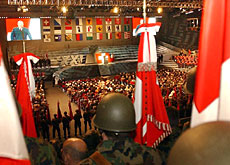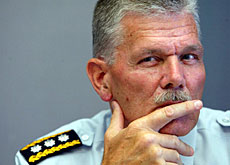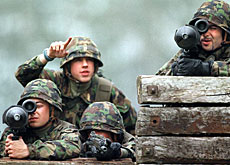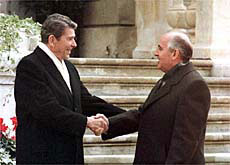Swiss inaugurate leaner army

More than 10,000 people have attended a colourful ceremony in Bern to inaugurate Switzerland’s newly reformed armed forces.
Last May, the Swiss voted in favour of government proposals to reduce the size of the army and restructure its civil protection scheme.
Trumpets and tambourines hailed the launch of Switzerland’s smaller army which starts operating as a professional force on January 1, 2004.
“The army has been adapted to meet new challenges,” Defence Minister Samuel Schmid told the spectators.
“It’s the most significant reform of the army ever carried out,” he continued. In his address, Schmid thanked all those who had served in the country’s armed forces.
Some 4,400 officials and flag carriers participated in the ceremony at a stadium in Bern, watched by more than 1,000 military, political and economic leaders, as well as 5,000 members of the public.
Army XXI
Three-quarters of voters backed a government programme to overhaul the army, which has been dubbed “Army XXI”.
The proposals called for a cut in the size of the army from 350,000 to 220,000 soldiers, while the upper age limit for military service would be lowered from 42 to 36 years.
Opponents of the move fear a smaller army would not be able to defend Switzerland adequately and insist that the reforms would damage the country’s militia system.
Some 80 per cent of Swiss came out in favour of reforming the civil protection system in May’s referendum.
“By accepting the reforms, the Swiss people have authorised two important elements of the defence policy,” Schmid said shortly after the vote.
All Swiss men aged 20 to 50, who are not doing military service, are currently required to take part in civil protection – giving the country a “reserve force” of around 280,000 which can be called upon in times of conflict or emergency.
The proposals would cut that number to 120,000 and lower the upper age limit to 40, under a new system coordinating the activities of the police, fire services, health service, utility services and civil protection in emergencies.
No great threat
Schmid told those gathered in Bern on Tuesday that Switzerland could afford a scaled-down army.
“Switzerland is not threatened by any enemy force and that is why we are lowering our preparedness for defence,” he said.
Indeed, “security with cooperation” is the reformed army’s new maxim.
Defending the country is no longer the armed forces’ top priority. This has been supplanted by a strategy to promote peace and provide aid in the event of disasters.
“Switzerland will no longer be in a position to assume its defence on its own. Security will be ensured on a different basis, and we must get used to that,” wrote Colonel Frédéric Greub in the December 2003 issue of the monthly publication “Our Militia Army”.
The participation of Swiss troops in security arrangements for the G-8 summit on Lake Geneva this summer was an example of the army’s new role.
On Monday parliament agreed to deploy up to 6,500 troops at next month’s WEF meeting in Davos.
swissinfo with agencies
As of 2004, the Swiss army will be reduced from 350,000 to 220,000 soldiers.
The upper age limit for military service will be lowered from 42 to 36 years.
The country’s “reserve force” of around 280,000 will be cut to 120,000.
The upper age limit for the civil protection force will be brought down by a decade to 40.

In compliance with the JTI standards
More: SWI swissinfo.ch certified by the Journalism Trust Initiative



You can find an overview of ongoing debates with our journalists here. Please join us!
If you want to start a conversation about a topic raised in this article or want to report factual errors, email us at english@swissinfo.ch.